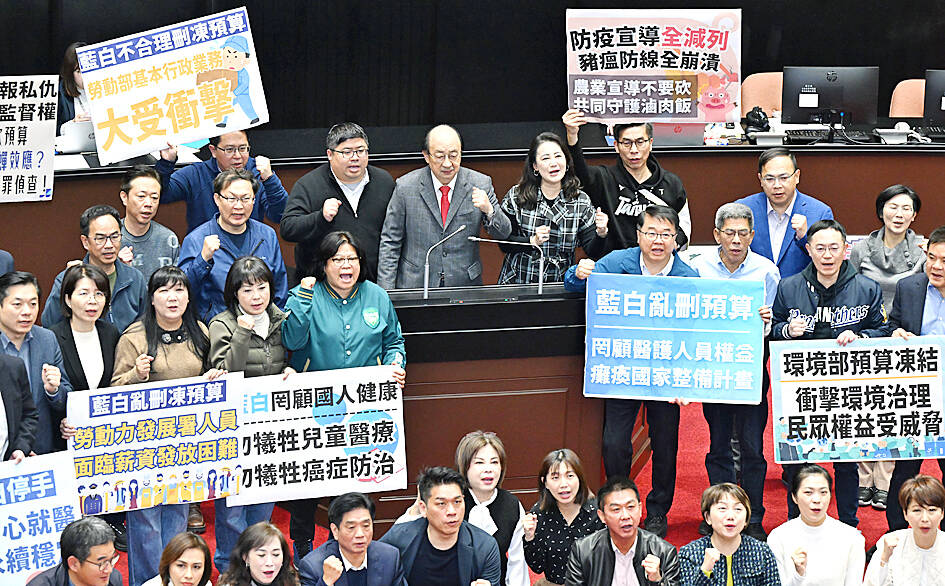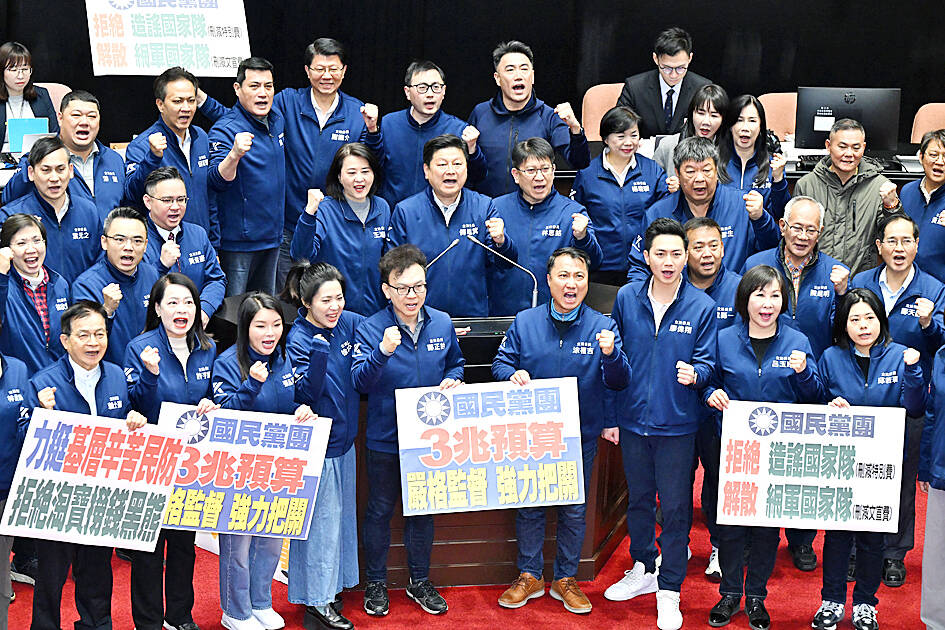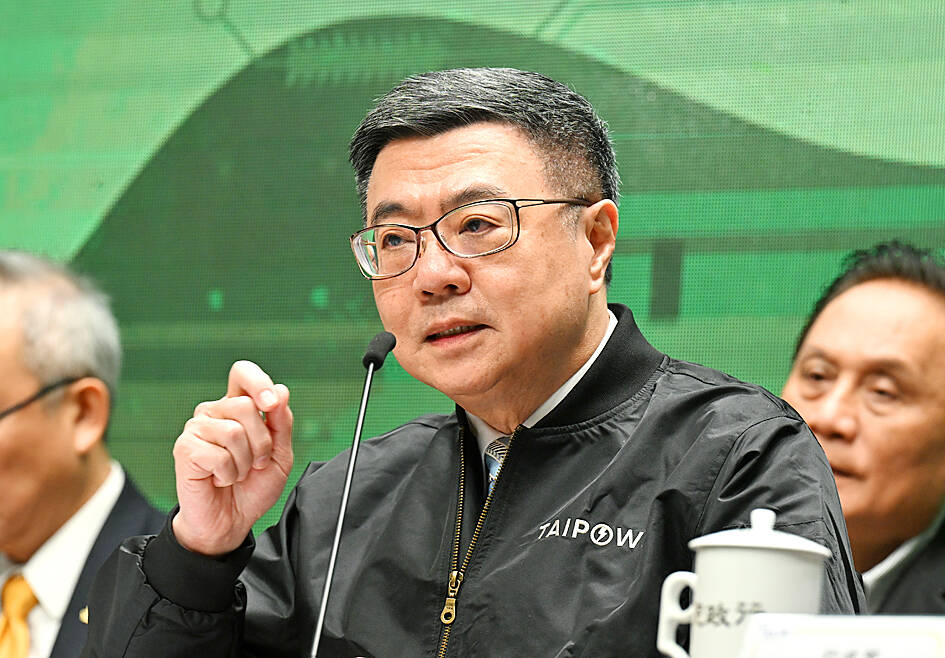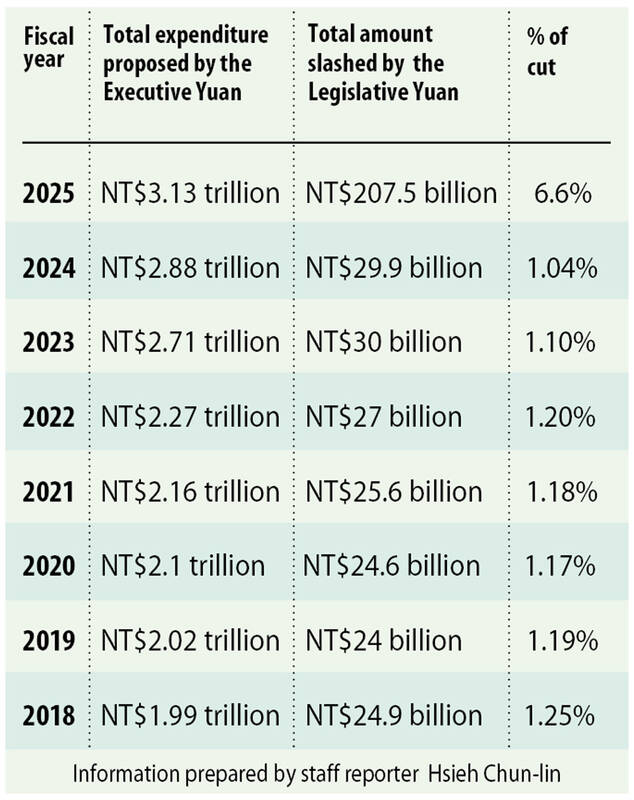The Legislative Yuan yesterday on third reading passed the central government budget for this year, cutting 6.6 percent from the Executive Yuan’s proposed expenditure — the largest in history.
The budget proposal, which the Cabinet approved in August last year, set government spending at NT$3.1325 trillion (US$95.6 billion), with projected revenues of NT$3.1534 trillion — both record highs — working out to a surplus of NT$20.9 billion.
On Friday last week, the opposition-led legislature voted to cut NT$93.98 billion from the budget’s general provisions.

Photo: Liao Chen-huei, Taipei Times
During a 20-hour continuous session from Monday until yesterday morning, they continued to slash the budgets of government agencies, bringing the total budget cuts to about NT$207.5 billion.
Cuts from general provisions include a 10 percent reduction in water and electricity fees, and 60 percent on special expenditures.
Special expenses for the Executive Yuan, the Mainland Affairs Council, the Council of Indigenous Peoples, the National Communications Commission, the Control Yuan, and the ministries of the interior, agriculture, digital affairs, justice, civil service and labor were completely eliminated.

Photo: Liao Chen-huei, Taipei Times
There would also be a 3 percent cut on military equipment and facilities.
Media policy and promotion expenses would be uniformly cut by 60 percent, unless otherwise specified.
More controversial proposals include a 70 percent freeze on the Executive Yuan’s operating expenses, a 50 percent cut and 30 percent freeze on the Control Yuan’s operating expenses, a 50 percent freeze on the Ministry of National Defense’s submarine budget and a 50 percent freeze on the Ministry of Foreign Affairs’ (MOFA) operating expenses.

Photo: Lin Cheng-kun, Taipei Times
While the opposition defended the reductions, saying they were seeking to stop wasteful spending, Premier Cho Jung-tai (卓榮泰) at press conference yesterday accused the opposition parties of “indiscriminately cutting budget items” in an attempt to disrupt the political operations of the Executive Yuan.
The proposed central government budget includes new items such as NT$79.8 billion for public construction, NT$41.5 billion for national defense expenditure, NT$36.6 billion for a National Health Insurance financial assistance program, NT$6 billion to improve the medical industry, NT$4 billion for a national cancer prevention program, NT$20 billion for public housing, NT$13.6 billion for national pension, NT$12.6 billion for National Science and Technology Council research projects, NT$5.3 billion for local teaching facilities and NT$4.9 billion for childcare services for children aged two to six, Cho said.
There is also an additional NT$2.2 billion for salary increases for public servants and military personnel that needs to be allocated, he added.

It is uncertain when the more than NT$260 billion frozen funds would be unlocked, which would delay many national projects and policies that are scheduled to start at the beginning of the year, Cho said.
Freezing 50 percent of the defense ministry’s submarine budget would undermine international confidence in Taiwan’s resolve to defend itself, he said.
Freezing 50 percent of MOFA’s operational budget would halt half of its activities at a time when Taiwanese diplomacy must remain strong to combat Chinese pressure, he said.
Separately, Bureau of Consular Affairs Deputy Director-General Chen Shang-yu (陳尚友) said the legislature’s 10 percent cut of administrative fees across all agencies — including about NT$120 million for the bureau — might affect passport issuance from October.
The bureau estimates that 2.05 million to 2.09 million new passports would be issued this year, but after the budget cut, the remaining funds would only be enough to issue about 1.85 million passports, so there might be difficulty issuing new ones from October, he said.
He also reminded the public to check their passport validity date if they plan to travel during the Lunar New Year holiday as consular offices would be closed from Saturday to Feb. 2.
People who need to renew their passport must apply before tomorrow to receive it on Friday.
Additional reporting by Chen Yu-fu, Lee I-chia and AFP

INVESTIGATION: The case is the latest instance of a DPP figure being implicated in an espionage network accused of allegedly leaking information to Chinese intelligence Democratic Progressive Party (DPP) member Ho Jen-chieh (何仁傑) was detained and held incommunicado yesterday on suspicion of spying for China during his tenure as assistant to then-minister of foreign affairs Joseph Wu (吳釗燮). The Taipei District Prosecutors’ Office said Ho was implicated during its investigation into alleged spying activities by former Presidential Office consultant Wu Shang-yu (吳尚雨). Prosecutors said there is reason to believe Ho breached the National Security Act (國家安全法) by leaking classified Ministry of Foreign Affairs information to Chinese intelligence. Following interrogation, prosecutors petitioned the Taipei District Court to detain Ho, citing concerns over potential collusion or tampering of evidence. The

NEGOTIATIONS: Taiwan has good relations with Washington and the outlook for the negotiations looks promising, Minister of Economic Affairs J.W. Kuo said Taiwan’s GDP growth this year is expected to decrease by 0.43 to 1.61 percentage points due to the effects of US tariffs, National Development Council (NDC) Minister Paul Liu (劉鏡清) said at a meeting of the legislature’s Economics Committee in Taipei yesterday, citing a preliminary estimate by a private research institution. Taiwan’s economy would be significantly affected by the 32 percent “reciprocal” tariffs slapped by the US, which took effect yesterday, Liu said, adding that GDP growth could fall below 3 percent and potentially even dip below 2 percent to 1.53 percent this year. The council has commissioned another institution

NEGOTIATIONS: The US response to the countermeasures and plans Taiwan presented has been positive, including boosting procurement and investment, the president said Taiwan is included in the first group for trade negotiations with the US, President William Lai (賴清德) said yesterday, as he seeks to shield Taiwanese exporters from a 32 percent tariff. In Washington, US Trade Representative Jamieson Greer said in an interview on Fox News on Thursday that he would speak to his Taiwanese and Israeli counterparts yesterday about tariffs after holding a long discussion with the Vietnamese earlier. US President Donald Trump on Wednesday postponed punishing levies on multiple trade partners, including Taiwan, for three months after trillions of US dollars were wiped off global markets. He has maintained a 10 percent

TRADE: The premier pledged safeguards on ‘Made in Taiwan’ labeling, anti-dumping measures and stricter export controls to strengthen its position in trade talks Products labeled “made in Taiwan” must be genuinely made in Taiwan, Premier Cho Jung-tai (卓榮泰) said yesterday, vowing to enforce strict safeguards against “origin laundering” and initiate anti-dumping investigations to prevent China dumping its products in Taiwan. Cho made the remarks in a discussion session with representatives from industries in Kaohsiung. In response to the US government’s recent announcement of “reciprocal” tariffs on its trading partners, President William Lai (賴清德) and Cho last week began a series of consultations with industry leaders nationwide to gather feedback and address concerns. Taiwanese and US officials held a videoconference on Friday evening to discuss the